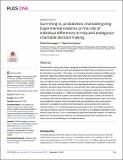Files in this item
Sure-thing vs. probabilistic charitable giving : experimental evidence on the role of individual differences in risky and ambiguous charitable decision-making
Item metadata
| dc.contributor.author | Schoenegger, Philipp | |
| dc.contributor.author | Costa-Gomes, Miguel | |
| dc.date.accessioned | 2022-09-23T11:30:20Z | |
| dc.date.available | 2022-09-23T11:30:20Z | |
| dc.date.issued | 2022-09-22 | |
| dc.identifier | 281434286 | |
| dc.identifier | c069e989-b2ed-4dd4-b609-15eafe4f8926 | |
| dc.identifier | 85138363961 | |
| dc.identifier | 000892255200028 | |
| dc.identifier.citation | Schoenegger , P & Costa-Gomes , M 2022 , ' Sure-thing vs. probabilistic charitable giving : experimental evidence on the role of individual differences in risky and ambiguous charitable decision-making ' , PLoS ONE , vol. 17 , no. 9 , e0273971 . https://doi.org/10.1371/journal.pone.0273971 | en |
| dc.identifier.issn | 1932-6203 | |
| dc.identifier.other | RIS: urn:46D76C4DB03C88D54C83F24EE269D1C1 | |
| dc.identifier.other | ORCID: /0000-0001-9930-487X/work/119628797 | |
| dc.identifier.uri | https://hdl.handle.net/10023/26064 | |
| dc.description | Funding: One of the authors, Philipp Schoenegger, has received a research funding from the Forethought Foundation and the Centre for Effective Altruism (they do not provide grant numbers). | en |
| dc.description.abstract | Charities differ, among other things, alongside the likelihood that their interventions succeed and produce the desired outcomes and alongside the extent that such likelihood can even be articulated numerically. In this paper, we investigate what best explains charitable giving behaviour regarding charities that have interventions that will succeed with a quantifiable and high probability (sure-thing charities) and charities that have interventions that only have a small and hard to quantify probability of bringing about the desired end (probabilistic charities). We study individual differences in risk/ambiguity attitudes, empathy, numeracy, optimism, and donor type (warm glow vs. pure altruistic donor type) as potential predictors of this choice. We conduct a money incentivised, pre-registered experiment on Prolific on a representative UK sample (n = 1,506) to investigate participant choices (i) between these two types of charities and (ii) about one randomly selected charity. Overall, we find little to no evidence that individual differences predict choices regarding decisions about sure-thing and probabilistic charities, with the exception that a purely altruistic donor type predicts donations to probabilistic charities when participants were presented with a randomly selected charity in (ii). Conducting exploratory equivalence tests, we find that the data provide robust evidence in favour of the absence of an effect (or a negligibly small effect) where we fail to reject the null. This is corroborated by exploratory Bayesian analyses. We take this paper to be contributing to the literature on charitable giving via this comprehensive null-result in pursuit of contributing to a cumulative science. | |
| dc.format.extent | 26 | |
| dc.format.extent | 753780 | |
| dc.language.iso | eng | |
| dc.relation.ispartof | PLoS ONE | en |
| dc.subject | BF Psychology | en |
| dc.subject | BJ Ethics | en |
| dc.subject | DAS | en |
| dc.subject | NIS | en |
| dc.subject | MCC | en |
| dc.subject.lcc | BF | en |
| dc.subject.lcc | BJ | en |
| dc.title | Sure-thing vs. probabilistic charitable giving : experimental evidence on the role of individual differences in risky and ambiguous charitable decision-making | en |
| dc.type | Journal article | en |
| dc.contributor.sponsor | Centre for Effective Altruism | en |
| dc.contributor.institution | University of St Andrews. Philosophy | en |
| dc.contributor.institution | University of St Andrews. School of Economics and Finance | en |
| dc.identifier.doi | https://doi.org/10.1371/journal.pone.0273971 | |
| dc.description.status | Peer reviewed | en |
| dc.identifier.grantnumber | n/a | en |
This item appears in the following Collection(s)
Items in the St Andrews Research Repository are protected by copyright, with all rights reserved, unless otherwise indicated.

